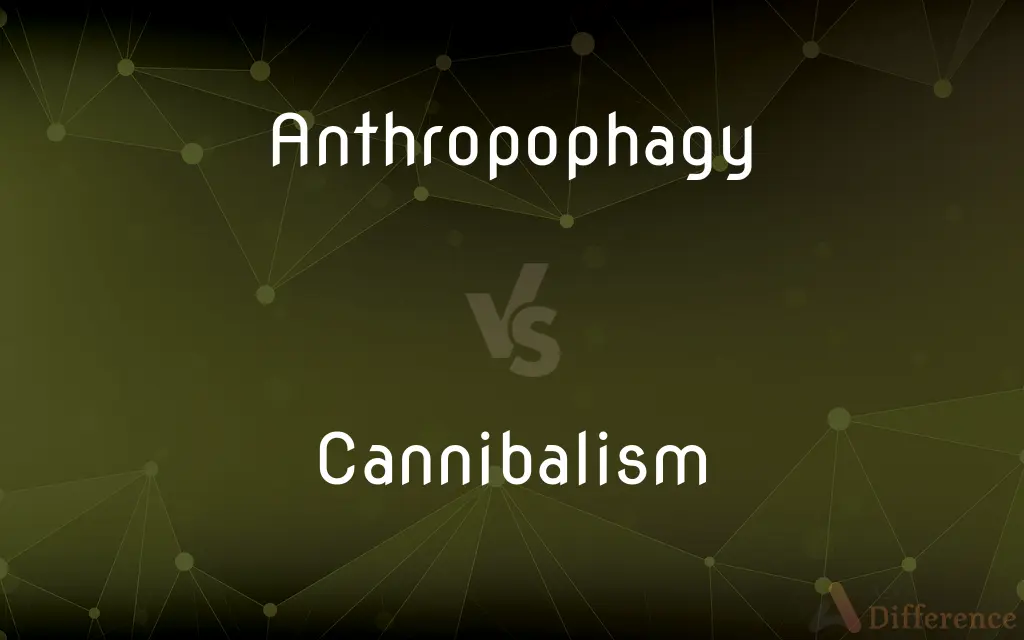Anthropophagy vs. Cannibalism — What's the Difference?
By Tayyaba Rehman & Maham Liaqat — Updated on April 1, 2024
Anthropophagy refers to the practice of eating human flesh by humans or animals, while cannibalism specifically denotes humans consuming human flesh.

Difference Between Anthropophagy and Cannibalism
Table of Contents
ADVERTISEMENT
Key Differences
Anthropophagy is a broad term that encompasses the consumption of human flesh by both humans and animals, highlighting a practice observed in various contexts, including survival situations, ritualistic ceremonies, and mythical lore. Cannibalism, on the other hand, is a subset of anthropophagy that specifically involves humans eating the flesh of other humans, often carrying cultural, social, and sometimes legal implications.
While anthropophagy can describe a survival tactic among animals or a rare behavioral anomaly in humans, cannibalism is usually laden with cultural significance, taboo, and often moral and ethical condemnation. This distinction underscores the specific human-on-human nature of cannibalism, as opposed to the broader concept of human flesh being consumed by any species in anthropophagy.
The study of anthropophagy can span across disciplines such as anthropology, zoology, and psychology, reflecting its occurrence across the natural and human world. Cannibalism, however, is predominantly examined within the realms of anthropology, history, and criminology, focusing on its role in human societies, rituals, and, in some cases, psychopathological behavior.
Instances of anthropophagy outside human societies are rare and typically observed in extreme conditions or survival scenarios. Conversely, cannibalism has been documented throughout history in various cultures and contexts, including as part of ritualistic practices, warfare tactics, or in times of famine, highlighting its complex role in human society.
The ethical and moral debates surrounding anthropophagy are often nuanced, considering scenarios like life-threatening situations where survival depends on the consumption of available human flesh. In contrast, discussions on cannibalism frequently involve considerations of consent, desecration, and the violation of social norms, reflecting the deeply ingrained taboos against this practice within human societies.
ADVERTISEMENT
Comparison Chart
Definition
The consumption of human flesh by humans or animals
The consumption of human flesh by humans
Context
Broad, includes any instance of human flesh being eaten
Specifically involves human-on-human consumption
Cultural Significance
Varied, can include survival situations
Often loaded with taboo, ethical, and moral implications
Disciplinary Focus
Anthropology, zoology, psychology
Anthropology, history, criminology
Ethical Considerations
Depends on context, sometimes neutral
Often condemned, involves issues of consent and desecration
Compare with Definitions
Anthropophagy
Refers to the consumption of human flesh by any species, including humans.
Anthropophagy has been observed in some animal species as a survival mechanism.
Cannibalism
Carries significant cultural, social, and legal implications.
In many societies, cannibalism is considered one of the most profound taboos.
Anthropophagy
Studied across various disciplines for its biological and cultural implications.
Researchers study anthropophagy to understand the conditions under which it occurs and its impact on societies and individuals.
Cannibalism
Specifically refers to humans eating the flesh of other humans.
Cannibalism has been practiced in certain cultures as part of ritualistic ceremonies.
Anthropophagy
Not always associated with cultural or ritual practices.
Anthropophagy can be a result of extreme survival situations without any cultural connotations.
Cannibalism
Examined for its role in human societies and histories.
Historians and anthropologists study cannibalism to understand its significance in various cultures.
Anthropophagy
Ethical and moral considerations vary based on context.
Anthropophagy in survival situations is often viewed differently than when it occurs in other contexts.
Cannibalism
Cannibalism is the act of consuming another individual of the same species as food. Cannibalism is a common ecological interaction in the animal kingdom and has been recorded in more than 1,500 species.
Anthropophagy
Can include survival scenarios where humans consume human flesh.
In dire circumstances, such as extreme isolation or accidents, anthropophagy may occur among humans for survival.
Cannibalism
A person who eats the flesh of other humans.
Anthropophagy
The eating of human flesh by human beings.
Cannibalism
An animal that feeds on others of its own kind.
Anthropophagy
A person who eats human flesh; a cannibal.
Cannibalism
The act of eating another of one's own species.
Anthropophagy
The eating of human flesh; cannibalism.
Cannibalism
(figurative) An act in which one thing consumes or takes over another of the same kind.
Anthropophagy
The eating of human flesh; cannibalism.
Cannibalism
In speech, the occurrence of one word eliding part or all of the next word, because the syllables are the same. For example, "Look, an MIT shirt" for "Look, an MIT T-shirt".
Cannibalism
The act or practice of eating human flesh by mankind. Hence; Murderous cruelty; barbarity.
Cannibalism
The practice of eating the flesh of your own kind
Common Curiosities
Are there cultural contexts where anthropophagy is accepted?
While anthropophagy might be observed in extreme survival situations, it is generally not culturally accepted.
What distinguishes cannibalism from anthropophagy?
Cannibalism is a specific form of anthropophagy that involves humans consuming other humans.
Has cannibalism ever been legal?
Cannibalism falls into a legal grey area in many jurisdictions but is generally prosecuted under laws against murder, desecration of corpses, or similar offenses.
What is anthropophagy?
Anthropophagy is the consumption of human flesh by humans or other animals.
Can anthropophagy occur in the animal kingdom?
Yes, anthropophagy can occur among animals, typically in extreme conditions or due to abnormal behavior.
What is ritual cannibalism?
Ritual cannibalism involves consuming human flesh as part of a ceremonial or religious practice.
Are there any known health risks associated with cannibalism?
Yes, consuming human flesh, especially the brain, can lead to diseases like kuru, a prion disease.
What impact does cannibalism have on a society's culture?
Cannibalism can deeply affect a society's culture, often serving as a symbol of ultimate taboo and shaping laws and moral values.
Can cannibalism have a religious or spiritual justification?
In some cultures, cannibalism has had religious or spiritual justifications, though these practices are rare today.
Is there any psychological explanation for cannibalism?
Psychological explanations for cannibalism can vary from survival instinct to pathological disorders.
How do historical instances of cannibalism influence our understanding of human nature?
Historical instances of cannibalism challenge our understanding of human nature, ethics, and the extremes of human survival and behavior.
How do societies view consensual cannibalism?
Even when consensual, cannibalism is often still viewed with moral and ethical condemnation due to deeply ingrained taboos.
Why might animals resort to anthropophagy?
Animals might resort to anthropophagy due to lack of food, abnormal stress, or pathological behavior.
How do modern societies deal with instances of cannibalism?
Modern societies deal with cannibalism through legal prosecution and moral condemnation, reflecting its taboo status.
Share Your Discovery

Previous Comparison
Interschool vs. Intraschool
Next Comparison
Shisha vs. HookahAuthor Spotlight
Written by
Tayyaba RehmanTayyaba Rehman is a distinguished writer, currently serving as a primary contributor to askdifference.com. As a researcher in semantics and etymology, Tayyaba's passion for the complexity of languages and their distinctions has found a perfect home on the platform. Tayyaba delves into the intricacies of language, distinguishing between commonly confused words and phrases, thereby providing clarity for readers worldwide.
Co-written by
Maham Liaqat













































